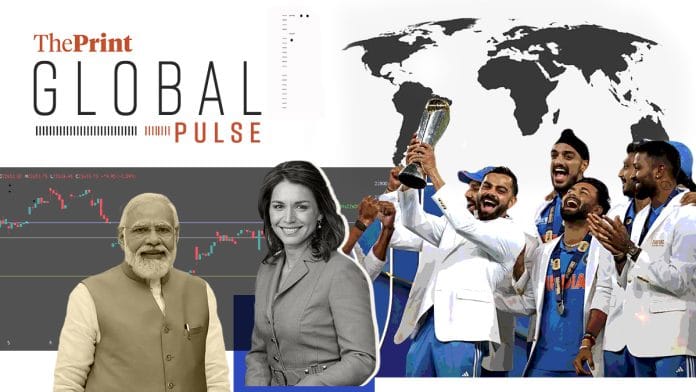New Delhi: The 2025 Champions Trophy saw an unprecedented venue shift as India refused to play in host nation Pakistan, sparking debates over the International Cricket Council’s (ICC’s) authority and cricket’s geopolitical future.
Cricket has always been a sport where geopolitics bleeds onto the pitch, especially in an embattled subcontinent where over two billion people tune in to watch cricket matches. But the latest geopolitical hitch—India refusing to play in Pakistan, the hosts of the tournament—has also hit a global nerve, with special concessions being made for India to play, and eventually win, their matches in Dubai. Other teams have had to work around this two-thousand-kilometre-long disruption.
“It has seemed like India’s from the start with visits to their matches feeling more like an exhibition while the rest of the action took place in Pakistan,” writes the BBC’s sports journalist Matthew Henry from Dubai.
There are no easy answers here, the BBC writes. It wouldn’t have been possible to play the tournament without India, when Indian markets make up 80 percent of the ICC’s income. Nor would it have been possible to take away Pakistan’s first chance to host a tournament in nearly three decades.
“The result was India playing the tournament in one city, remaining in one hotel, as the row over the advantages they held rumbled on throughout,” writes Henry. “Speak to players in private and the power India seemingly holds is simply met with a shrug. This is the path cricket is on.”
The BBC concedes that “India’s strength is such that they might well have won this tournament wherever it was played”, but it does not bode well for the future of the ICC, which has increased its men’s events to counter the “money-spinning” IPL. An “indifference is perhaps beginning to set in”, the BBC reports, pointing to the fact that there were no written journalists from India’s fellow semi-finalists—Australia, South Africa, or New Zealand—at the Champions Trophy, implying that India’s win was a foregone conclusion.
“You be the judge about whether this tournament came up in the family WhatsApp group,” the BBC writes. “A dearth in quality is not a threat to international cricket’s future. Apathy is.”
The New York Times reports on the US’s new director of national intelligence and her upcoming trip to Asia: Tulsi Gabbard is travelling to Japan, Thailand and India, and will visit France on the way back to the US.
She will be speaking at the Raisina Dialogues in Delhi, which the New York Times misspells (twice) as “Rasina”.
Gabbard was invited to speak at Raisina, described as “a multinational gathering of security officials in New Delhi” by Prime Minister Narendra Modi. Trump administration officials have confirmed that she will “hold bilateral meetings with Indian officials and officials from other countries”.
“The Rasina [sic] conference is often attended by senior Russian security officials and experts,” the New York Times continues. “It is not clear, however, whether Ms Gabbard will have bilateral meetings with Russian officials on the conference’s sidelines.”
Instead, she will be speaking about “counterterrorism, cybersecurity, artificial intelligence and intelligence sharing” in New Delhi.
Meanwhile, Mihir Sharma—a senior fellow at the Observer Research Foundation, who co-hosts Raisina Dialogues with the Ministry of External Affairs—writes in his column in Bloomberg that leaders “must stop mythologising the market’s retail revolution.”
“Policymakers in New Delhi tend to maintain a lordly indifference to turbulence in equities. But, on this occasion, they need to pay closer attention,” writes Sharma.
The NSE Nifty 50 Index has declined for ten straight days, down about 14 percent since markets lost $1.3 trillion in value since last September.
“The slide in the index would be far worse if not for the fact that domestic investors have been on the other side of this trade. They have been steadily buying what the foreigners sell—and that’s exactly why we should worry,” Sharma writes.
It is because India is in the “middle of a share-buying revolution”, a development that many have been watching with interest. New investor registrations have gone up by three times since before the pandemic, and the stock market now has 110 million unique investors—in a country with 320 million households, Sharma notes.
“One way of looking at this is that regular citizens have their ears close to the ground, and therefore know something the ‘smart money’ doesn’t. You often hear people praise the resilience of small investors, and tributes to their faith in the India growth story are common,” writes Sharma. “Nice, if it’s true. But what if it isn’t? When one side of a trade has the entire world to invest in and the time and resources to analyse fundamentals, and the other side has faith and hope, who do you really think is getting the better of the deal?”
People are beginning to worry, especially with India’s growth momentum slowing down. The market downturn will adversely affect these new small investors, who might feel betrayed—“it would be a terrible outcome if they wind up sitting on their savings for a generation”, Sharma worries.
“Political leaders must immediately stop mythologising the retail investment revolution. It isn’t because of some numinous faith in India; people are buying stocks because apps and SIPs have made it much easier, and because they don’t have anywhere else to put their money. And what should leaders be doing to change this?” he asks.
Ordinary Indians should be given options—whether through better social security or higher-return bank deposits. Policymakers should be able to give consumers a safety blanket, to protect them from risks they “don’t have the bandwidth to process.”
“People who lose their savings also lose their trust in the system,” writes Sharma. “That’s any politician’s worst nightmare, and leaders should worry it’s coming true.”
(Edited by Radifah Kabir)
Also Read: World media has 2 warnings for India—climate-induced stress & ‘tax terrorism’ despite Modi’s reforms






